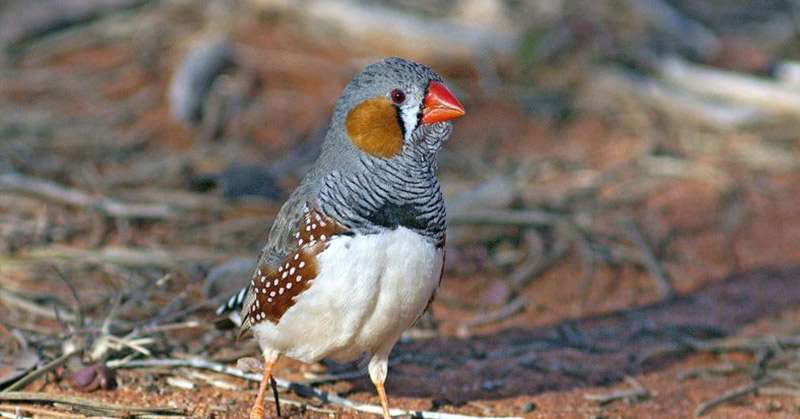After several decades of extensive research, scientists finally established that truly, embryos from several bird species such as quails and chicken can hear through their eggs [1]. Some other species listen to their parents’ incubation calls and may be able to mimic the sounds exactly when they hatch. However, embryonic learning has always been associated with poultry birds whose chicks are immediately able to fend for themselves on hatching. It’s been unclear if songbirds share the same ability since a lot of their eggs hatch stilly fully dependent on their parents for the first few weeks after birth.
However, a recent study suggests that Australia’s zebra finches may be capable of embryonic learning through incubation calls, after all [2]. The zebra finch is one of the most widely studied birds in the world, native to Central Australia and can be found almost anywhere on the continent. This species is adapted to survive in very hot climates, although temperatures above 40 degrees Celsius may be lethal to the birds. The parents launch into special songs when the weather becomes unbearable – a trait that is believed to nurture the chicks before they hatch with the ultimate adaptation skills.
Incubation calls may directly affect hatchling survival
Published in the journal Science in 2016, the study reports that incubation calls may affect the way the chicks thrive in the hot environment after hatching [3]. Although the birds have been extensively studied for several decades, no one paid attention to the unique calls they make during incubation. These birds sing so much that it would have been nearly impossible to identify any peculiar sounds and the time frame.
While the researchers have referred to the study as merely “the tip of the iceberg”, it casts a ray of hope on the survival rates of birds and possibly other species in a rapidly warming climate.
“This acoustic signal is potentially being used to program the development of offspring,” says Kate Buchanan, a senior author of the new paper. “Hearing the call affects your rate of growth relative to the temperature that you experience. Animals have very subtle ways of inferring how the environment is likely to change, and (being able) to develop and adapt accordingly.”
The unique calls were discovered by Mylene Mariette, a post-doctoral researcher at Deakin University of Australia and lead author of the study. She compared it with data from a previous study and set about testing her theory.
Read: Bald Eagles Keep Dying Because of Lead Poisoning And No One’s Talking About It
The process
The researchers observed that the parent finches only belted out the incubation songs when the temperature was above 78 degrees Fahrenheit. It was unclear if the calls were made by the males or the females, although incubation is mostly done by the females.
The study was completely based on birds living in natural conditions in the wild. They collected dozens of finch eggs for incubation under two different groups, while they replaced these eggs with artificial ones in the wild.
Since they weren’t sure which gender made the incubation calls, they recorded the songs from 61 males and 61 female parent zebra finches. During the last 3 to 5 days of incubation, they played different sounds to the groups of eggs. When they hatched, the eggs were returned to the wild and the scientists observed different growth curves as the hatchlings matured.
Observations:
The hatchlings exposed to their parents’ incubation calls were found to have smaller body sizes when the nest became warmer. Smaller birds have been found to thrive better in warm temperatures because body size affects thermoregulation and energetics [4]. Smaller birds are more resilient to elevated temperatures and would have far less tissue damage than their larger counterparts.
Also, the hatchlings exposed to the calls seemed to have pre-imbibed knowledge of survival tactics as they matured into adults. They were found to select warmer nests more suitable for their body systems than the birds in the control group.
“Hearing that call before you even hatch affects your development, affects your growth rate, probably affects your vocalization and it affects your behavior and choice 100 or 200 days later when you go to nest yourself,” Professor Buchanan says.
Implications
Buchanan explains that this groundbreaking research into zebra finches sparks interest in other species. One can only wonder what information and training parents can pass to their young through embryonic learning.
“It makes me wonder what signal babies are picking up before they are born, whether they are hearing their parents arguing or loud noises,” she says.
Warm climates are usually unpredictable and unsteady. Parent zebra finches only choose to breed when the conditions appear relatively right. When the eggs are laid and the weather begins to shift again, they could be using the incubation calls as a way to prepare their chicks for the unstable environment.
However, more investigation is required to better understand the impact of embryonic learning on adaptation to climate change. Buchanan says that while the study may prove that zebra finches are highly adaptable, it doesn’t exactly prove that they can cope in extremely hot climates.
Keep Reading: Photographer Captures One of the Last Female Eagle Hunters of Mongolia
- Rob Waugh. Chicks can be ‘woken’ up inside eggs by clucking noises – so can premature babies ‘learn’ more than we thought? Daily Mail. https://www.dailymail.co.uk/sciencetech/article-2139023/Chick-embryos-woken-inside-eggs-clucking-noises.html. Retrieved 11-03-2020
- Joshua Rapp Learn. Birds Sing to Their Eggs, and This Song Might Help Their Babies Survive Climate Change. Smithsonian Magazine. https://www.smithsonianmag.com/science-nature/birds-talk-their-eggsand-song-might-help-their-babies-deal-climate-change-180960168/. Retrieved 11-03-2020
- Ostrove et al. Design, synthesis, and testing toward a 57-codon genome. Science Magazine. https://science.sciencemag.org/content/353/6301/819. Retrieved 11-03-2020
- Gardner et al. Declining body size: a third universal response to warming? Pub Med. https://www.ncbi.nlm.nih.gov/pubmed/21470708. Retrieved 11-03-2020

